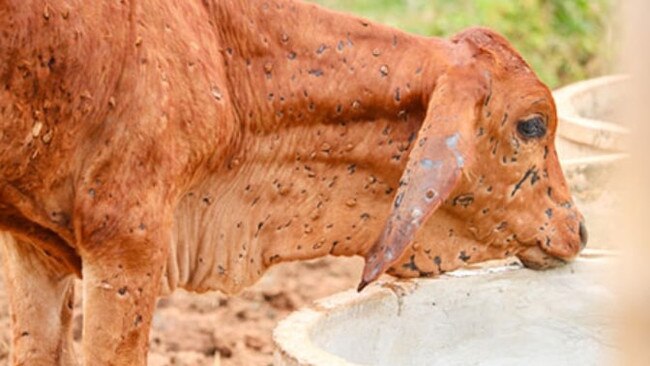Tests find no cattle with lumpy skin disease but Indonesian suspension tightens
Testing of 1000 Australian cattle found no lumpy skin disease, but Indonesia has not lifted its live export suspension.

Indonesia has increased its suspension of live cattle exports from Australian facilities despite wide-ranging testing of 1000 cattle failed to find a trace of lumpy skin disease in northern Australia.
The addition of three cattle feeding yards to the list of affected facilities, even after the federal government provided the results of its testing regime, has prompted Australia to send a delegation to Jakarta to break the impasse.
Australia’s top veterinary officer will lead a high-powered meeting with Indonesian officials on Thursday to convince the country of the efficacy of the tests in order to have the suspensions lifted.
Four holding yards in Queensland, Western Australia and the Northern Territory have been suspended since late July after Indonesian authorities said cattle transiting through the facilities had tested positive for the disease after arriving in Indonesia.
On Sunday, the country said eight cattle from three more yards in the NT and WA had tested positive to the virus.
Australian authorities say it is probable the affected cattle contracted the virus, which can be spread by biting insects, after their arrival in Indonesia, on the export ship, or through vaccines.
Instead of outright adding the three new feeding yards to the suspension list, Indonesian authorities said cattle processed there could continue to be shipped provided they were subject to individual blood and saliva tests before departure.
But that stipulation effectively ruled out the yards because of the extra cost and time required to conduct the testing before loading onto ships.
The federal government insists the disease is not present in Australia and said the extensive testing across a 2800km span in the country’s north had not found any cattle with the disease.
“The Department of Agriculture, Fisheries and Forestry has finalised an investigation into the health status of Australia’s northern cattle herds,” Acting Chief Veterinary Officer Beth Cookson said.
“The investigation was conducted to provide the assurances that Indonesia and Malaysia requested in response to LSD being detected in a small number of Australian-origin cattle after they had arrived and spent time in Indonesia.
“The department, with the support of the WA, Qld and NT governments, along with industry, has conducted rapid diagnostic testing of more than 1000 head of cattle across northern Australia. Our testing did not detect LSD in Australia and our disease status has not changed.”
Indonesia and Malaysia, which also suspended Australian cattle imports, have been provided with the results.
“We are awaiting advice from the relevant Indonesian and Malaysian authorities on the lifting of their cattle and buffalo import restrictions,” Dr Cookson said.
Frustrated by Indonesia’s refusal to accept the evidence and lift the ban, the federal government has assigned Dr Cookson to lead the technical team to Indonesia to work with their local counterparts.
“The meeting will likely look for improved technical understanding and ideally a resolution and lifting of the current suspensions based on Australian testing results submitted,” industry group Cattle Australia said in a letter to its members.
Agriculture Minister Murray Watt has also raised the issue with his Indonesian counterpart, calling for a “timely and practical solution” to the issue.
When the suspension was first announced in July, Australian authorities had privately said they hoped the problem would be fixed within two weeks.
Indonesia is Australia’s primary market for live cattle exports, taking more than 300,000 cattle a year.
Lumpy skin disease can cause significant production losses in cattle and is easily spread by biting insects.




To join the conversation, please log in. Don't have an account? Register
Join the conversation, you are commenting as Logout